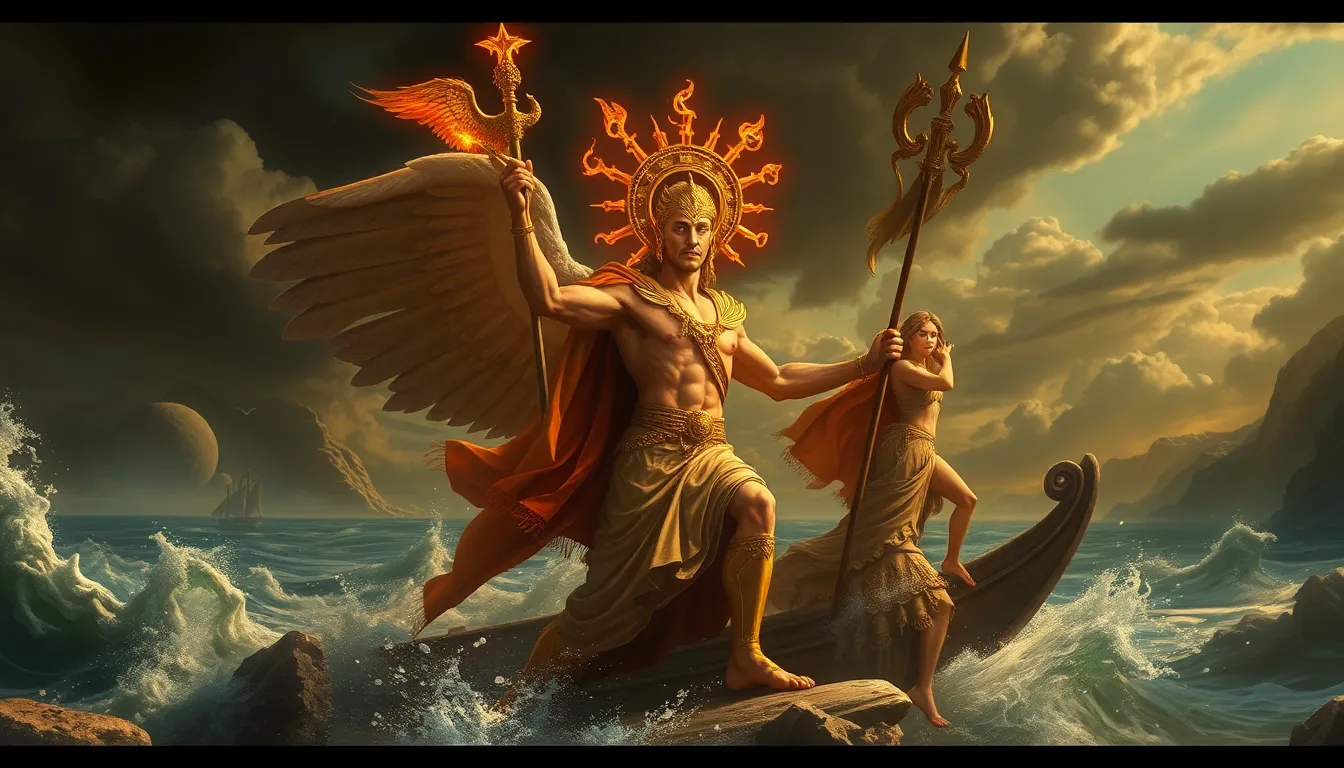The Role of Divine Retribution in the Myths of the Argonauts
I. Introduction
Divine retribution, a fundamental concept in Greek mythology, refers to the punishment inflicted by the gods on mortals who transgress moral laws or display hubris. The myths of the Argonauts, a group of heroes led by Jason in a quest for the Golden Fleece, are rich with examples of divine retribution that not only shape their narratives but also influence their character arcs. These stories serve as cautionary tales about the consequences of defying the divine order.
The Argonauts hold a significant place in Greek mythology, representing the ideals of heroism, adventure, and camaraderie. Their journey is marked by trials that test their bravery and morality. This article will explore how the concept of divine retribution plays a crucial role in shaping the narratives and character arcs within the myths of the Argonauts.
II. Historical Context of the Argonauts’ Myths
The origins of the Argonauts’ stories can be traced back to ancient Greek literature, where they were first documented in texts such as Apollonius of Rhodes’ “Argonautica.” This epic poem recounts the adventures of Jason and his crew as they sail aboard the Argo in search of the Golden Fleece, a symbol of authority and kingship.
Key sources that contribute to our understanding of the Argonauts include:
- Apollonius of Rhodes – “Argonautica”
- Hesiod – “The Theogony”
- Ovid – “Metamorphoses”
- Other classical poets and playwrights who reference the myths
The cultural significance of the Argonauts in Greek mythology lies in their representation of the heroic ideal and the pursuit of glory, often intertwined with the favor or disfavor of the gods.
III. Understanding Divine Retribution
Divine retribution is a recurring theme in mythology, characterized by the gods’ responses to human actions, particularly those that display pride or moral failings. Examples of divine retribution in mythology include:
- The punishment of Arachne by Athena for her hubris in weaving.
- The fate of Niobe, who was turned to stone for boasting about her children.
- The various punishments inflicted on Odysseus for his defiance against Poseidon.
The moral and ethical implications of divine punishment are profound, as they serve to enforce the importance of humility, respect for the divine, and adherence to moral principles. In Greek mythology, the relationship between gods and mortals is complex, often characterized by a delicate balance that, when disrupted, leads to dire consequences.
IV. Instances of Divine Retribution in the Argonauts’ Journey
Throughout the Argonauts’ journey, divine retribution manifests in various ways, often through the actions of deities such as Hera, who plays a crucial role in guiding and punishing the heroes. Key instances of divine retribution include:
- The punishment of the crew members for their disobedience and disregard for the gods’ wishes.
- Fates that befall those who exhibit hubris, such as the tragic end of Apsyrtus, Jason’s half-brother.
Specific events illustrate these themes of divine retribution, with consequences often resulting from the hubris and moral failings of the Argonauts. For instance, when the crew fails to honor the gods or heed their warnings, they face dire challenges, such as storms and monsters.
V. The Function of Divine Retribution in Character Development
Divine punishment serves as a pivotal mechanism for character development among the Argonauts. Key transformations occur as a result of divine retribution, particularly in Jason’s journey. His initial quest for glory and the Golden Fleece is marred by moral dilemmas and the repercussions of his actions.
The impact of divine retribution on Jason’s hero’s journey includes:
- A realization of the importance of humility and respect for the divine.
- Opportunities for redemption and personal growth following moments of failure.
Exploring themes of redemption and forgiveness, the Argonauts’ narratives showcase how divine wrath can lead to a deeper understanding of one’s purpose and the importance of moral integrity.
VI. Comparative Analysis: Divine Retribution in Other Greek Myths
When comparing the concept of divine retribution in the myths of the Argonauts with other heroic tales, such as those of Odysseus and Perseus, similarities and differences emerge. Common themes include:
- The consequences of hubris and the need for respect towards the gods.
- The journey towards redemption and the moral lessons learned.
However, the Argonauts’ stories also emphasize camaraderie and collective responsibility, distinctive from the solitary journeys of characters like Odysseus. This universal theme of divine retribution serves as a reminder of the moral structure that governs not only individual actions but also group dynamics in mythology.
VII. The Legacy of Divine Retribution in the Argonauts’ Myths
The myths of the Argonauts have continued to inspire modern interpretations and adaptations across various forms of media. The concept of divine retribution remains relevant in contemporary discussions of morality, illustrating how ancient stories resonate with current ethical dilemmas.
Influences on literature, art, and popular culture include:
- Modern retellings of the Argonauts’ journey in novels and films.
- Artistic depictions that explore themes of heroism and divine punishment.
- The incorporation of moral lessons in educational contexts.
VIII. Conclusion
In summary, the role of divine retribution in the myths of the Argonauts operates as a critical element that shapes their narratives and character arcs. The enduring power of these myths highlights the implications for understanding human behavior and ethics, offering timeless lessons on humility, respect, and the consequences of one’s actions.
As we reflect on the richness of these stories, it becomes clear that the concept of divine retribution not only defines the relationships between gods and mortals but also serves as a mirror for our own moral choices and societal values.




